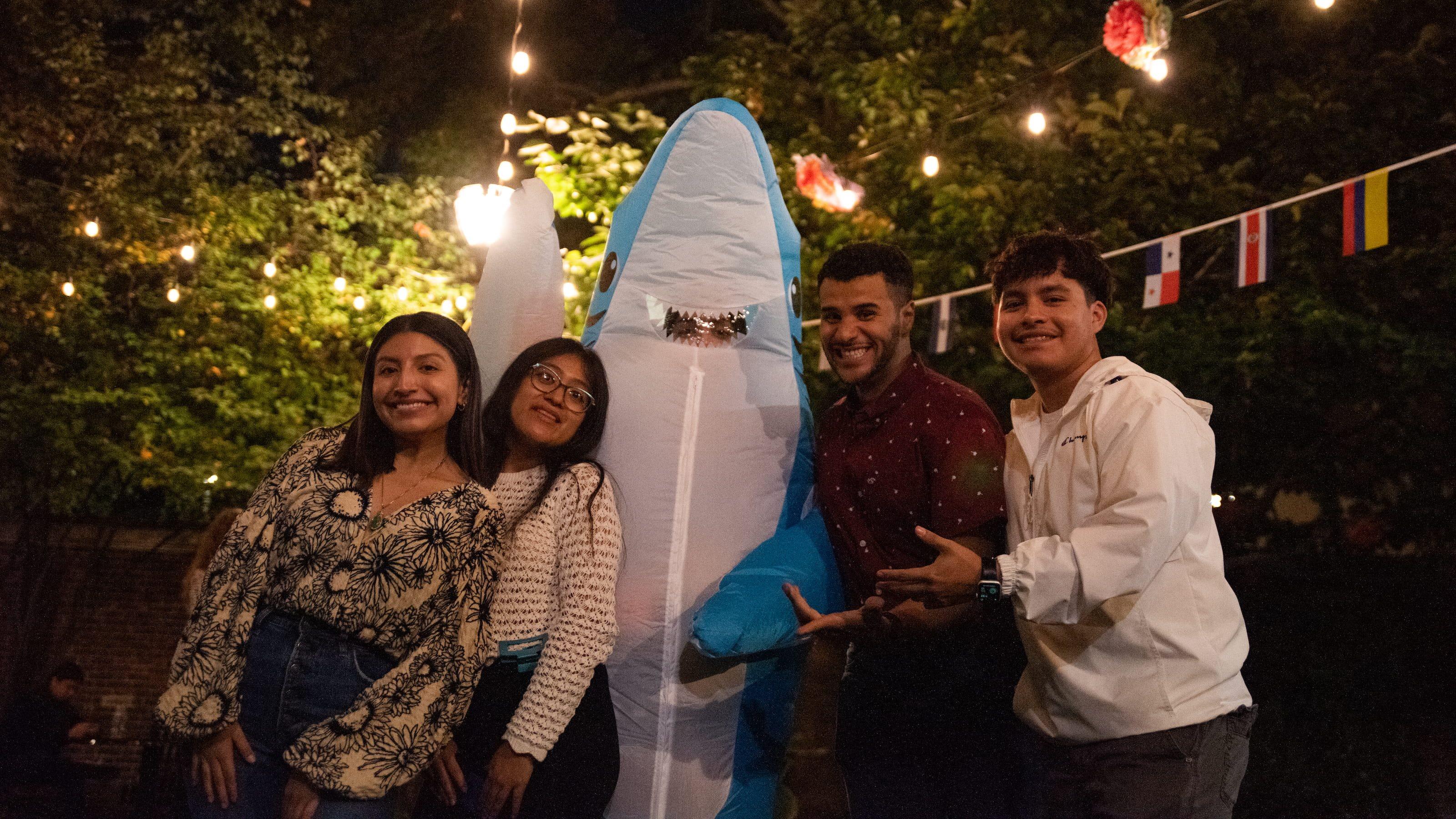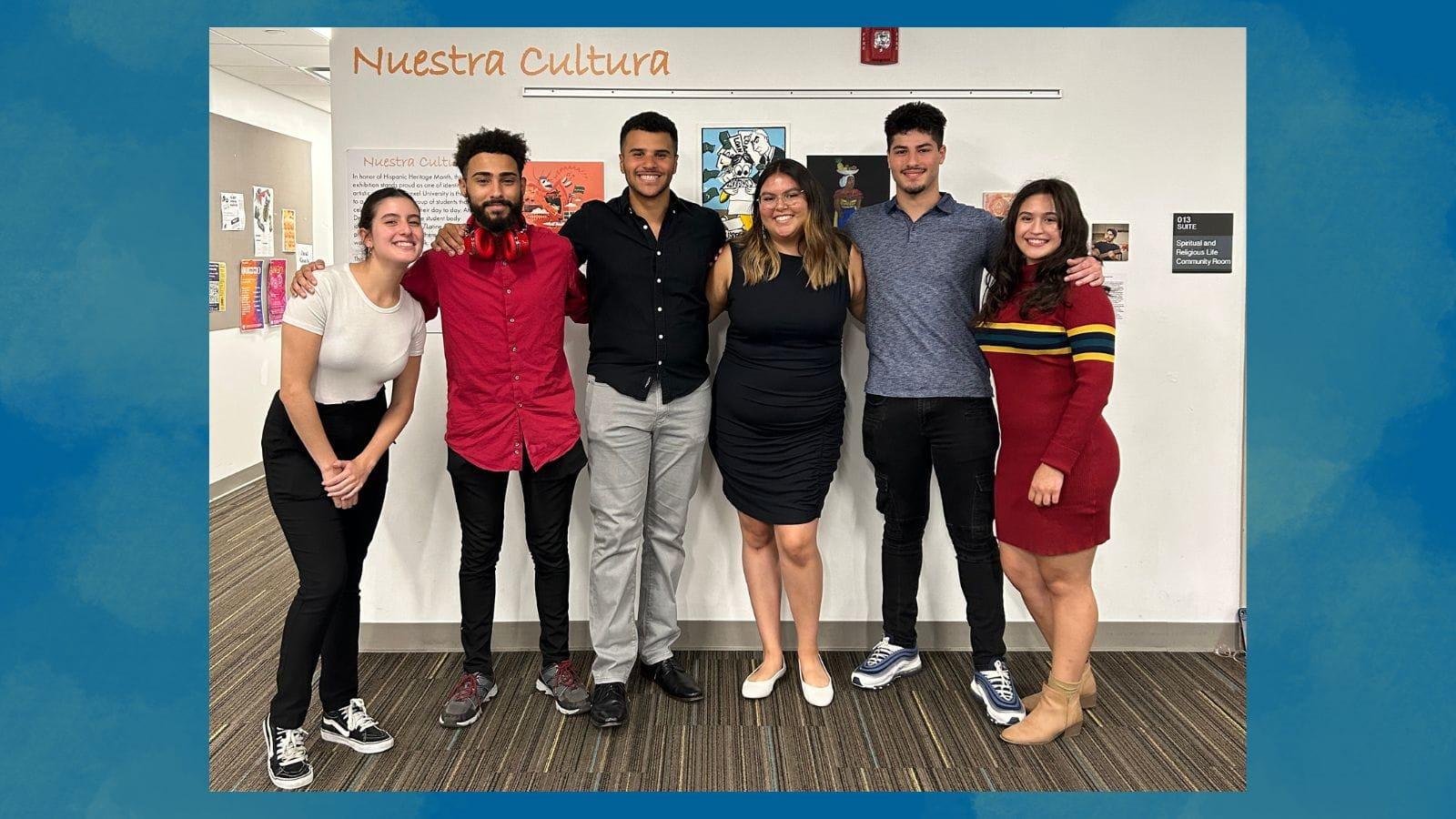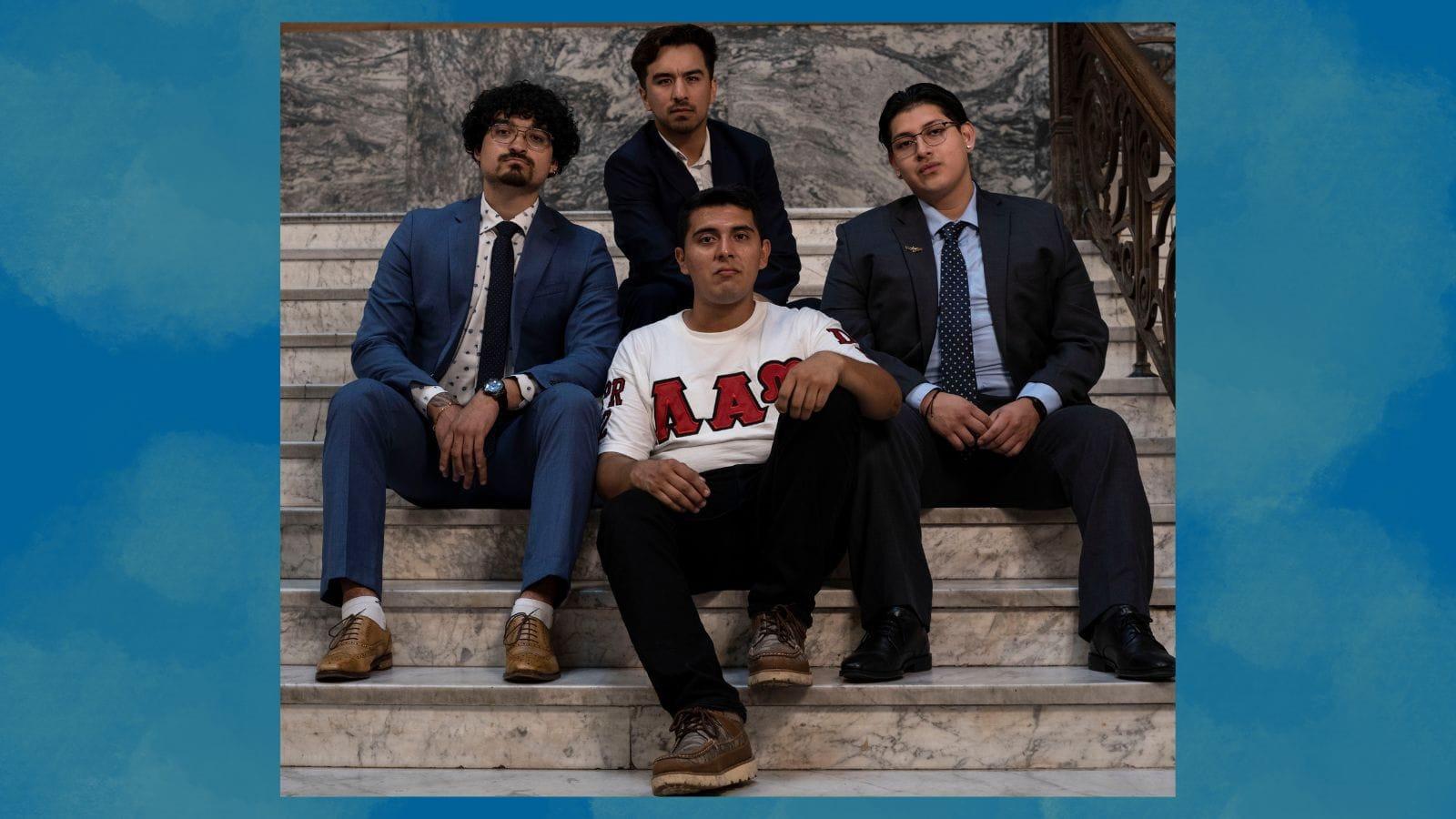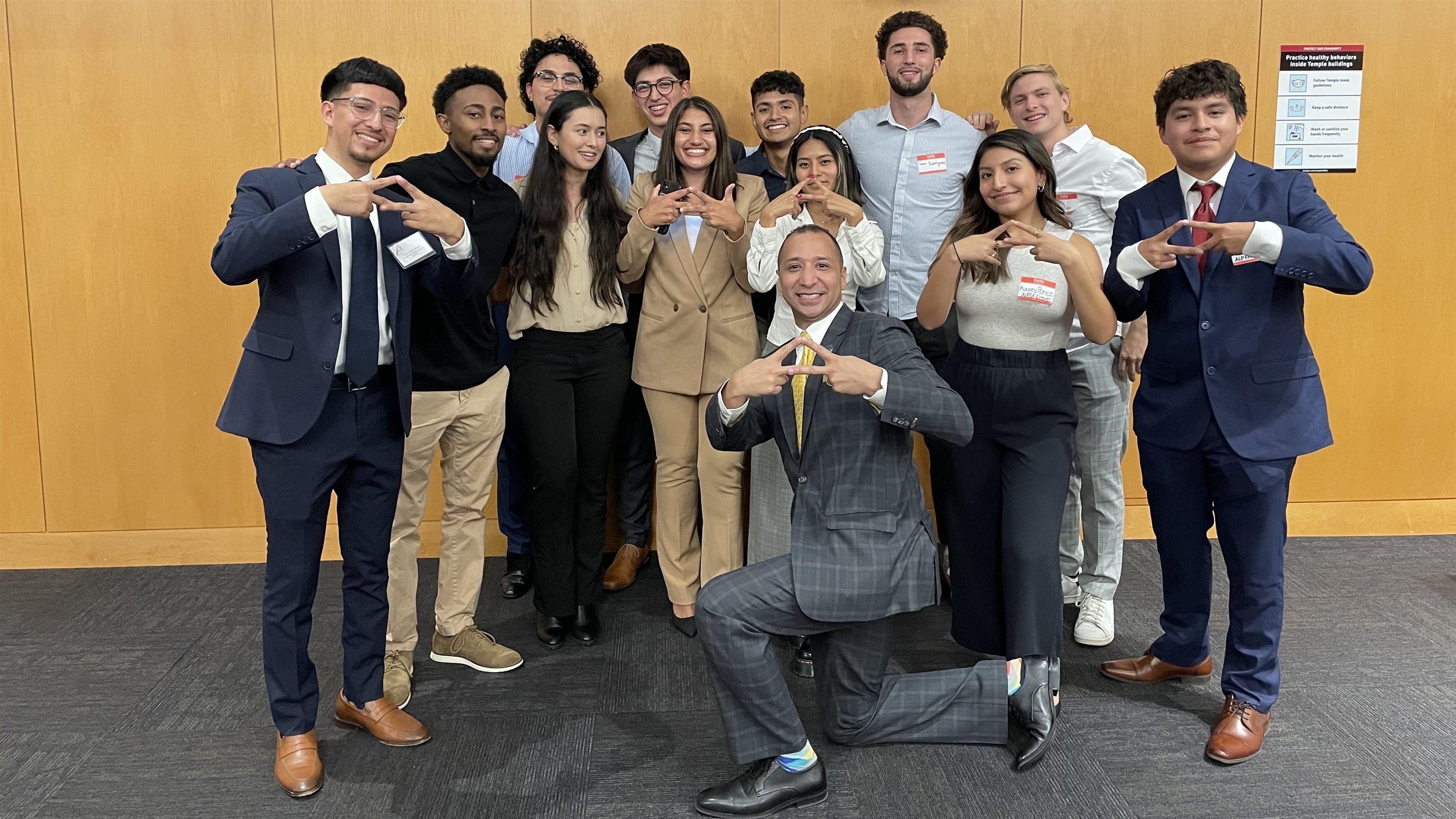How the Latino Experience has Evolved on Drexel's Campus

LUC's executive board.
Only about six percent of Drexel University’s student body identifies as Hispanic or Latino, but thanks to the efforts of students in the community, they’ve been able to come together and find friends within the community’s range of backgrounds and experiences. Jess Jha, a senior who serves as public relations chair for Latinos for a United Campus (LUC), is glad she got involved with the group despite being in her last year as an undergraduate.
“‘Hispanic’ is a very broad term, so just getting to know the different types of cultures that make up LUC from Mexico or Puerto Rico or Ecuador and just seeing how, even though we share a common language, or sometimes not, there are a lot of differences and similarities in cultural upbringings,” Jha said. “However, there are things that not a lot of people can relate to outside a Latin community, so it’s comforting to find other people that I can have a close bond with by not even having to say much.”
LUC has seen a renaissance of sorts since the pandemic, thanks to efforts from LUC’s current leadership. For a while, the social organization had dwindled to hosting just a few events a year and membership declined, but now, leadership has fostered a vibrant organization with increasing membership and engagement. For example, LUC recently hosted “Nuestra Cultura,” an art exhibit with works by members in honor of Hispanic Heritage Month. Students were able to attend the exhibit and a “Meet the Artists" event, get to know other members interested in the community and have their own space on campus.
This year, members of LUC’s now 25-member board began creating archives to document the history and growth of Latinx spaces on Drexel’s campus. They’ve dated it back to 2010, when Drexel’s Association of Latino Professionals in America (ALPFA) was established a year before LUC was started. Like other organizations, ALPFA membership declined and stagnated during the thick of the pandemic. Now that students are back on campus, LUC leadership and ALPFA Vice President Kasey Ponce observed more people are ready to join, and ALPFA has increased activity and membership. Lambda Alpha Upsilon (LAU), a Latino fraternity, was created in 2019 and has had several brothers join and graduate.
Students in leadership positions in those organizations, detailed below, say there’s still plenty of room to grow, especially with how organizations for minority groups on campus are recognized and supported. All of those groups have been expanding and increasing events and their presence, for both Latino students and those who do not identify as Latino, after the return to campus from the COVID-19 pandemic.

Members of LUC showcased their art in an exhibit called Nuestra Cultura.
When Luis Benitez came to Drexel in 2019, he found a space where he could connect with other Latino students.
But what he found was just that one space — a room in the Creese Student Center. After a few weeks he and Laura Rendón-García learned about Latinos for a United Campus (LUC), which at the time was mostly hosting occasional events. 2 years later, Benitez, Rendón-García and a board of other students have taken the group to another level, after Rendón-García became president in 2021 and Benitez the vice president (Benitez now serves as president).
“Under her leadership, we were able to bring in this renaissance that we’re currently in,” Benitez said. “We used to only do one big event officially, but now we’ve done 14 events on our own, and about 25 with collaborations. We have 106 members. With every passing project we’ve learned something, and I’m super proud of the team that is with me this year, and I can’t wait for the future.”
Rendón-García wanted to combat the shrinking number of events that happened during the pandemic. She saw a lot of potential in the community and believed it could be more. Benitez pushed her to start everything up again, because he felt her experience as a first-generation college student and Colombian- American would be important.
“We wanted it to be something personal and something you can physically see on Drexel’s campus,” Rendón-García said. “We wanted it to be a place where people can find themselves or learn about the culture or other people. That was what drove everything.”
Things were still mostly virtual as they got LUC up and running into the vibrant organization it is now, introducing “office hours” where members could speak Spanish with other Drexel students who wanted to practice and improve their language skills and plan their inaugural Latinx Heritage Month celebration in 2021.
“That was probably the catalyst that set everything else off,” Rendón-García said. “We wanted the community to look different than it did before because it didn’t feel like there was a sense of connectedness. It felt like people doing things in their own groups.”
Now, they’ve put on events that speak to the specific and shared experiences of Latino students, like a prom for students who didn’t get to attend theirs in high school. Rendón-García, Benitez and Jha want LUC to be open to anyone, whether they have personal connections to the Hispanic community or are simply interested in learning more and connecting with new people.
“We've had people who have a grandparent from a Latin American country, and they want to connect with the culture and we have people who want to know more about their own connections,” Rendón-García said. “I wanted this group to be really welcoming, so it doesn’t matter what your interests are. Everyone has a place and will be accepted as they are.”
Rendón-García and Benitez don’t want LUC, which has a 25-member board and most of them are sophomores and juniors, to be seen as the “umbrella organization” for Latino students — both now and in the future — but instead as a place that’s been built by and for the students who are a part of it.
“As president, I am so calm about the next generation,” Benitez said. “We’re now seeing the fruits of the time and efforts that Laura [Rendón-García] and myself and others dedicated to community.”

Lambda Alpha Upsilon currently has four members.
For Andrew Espinoza, LUC became a home. But he wanted to create something more for himself and other Latino men at Drexel. His freshman year, he founded the University’s chapter of Lambda Alpha Upsilon, a Latino-oriented fraternity.
“I was a first generation, low-income student, and I never had any experience with college and never really knew anybody who went to university,” Espinoza said. “I looked around and I was the only Latino anywhere. I got really tired of that. I was really homesick because my entire life, I grew up around Black and Hispanic kids.”
He found a family in LUC, and was inspired to make a group for himself after he was inspired meeting with the brothers of LAU’s national chapter (at the urging of the LUC president). At first, it was a chapter of one. Espinoza didn’t want to quit — he wanted to build something for himself and realized this was something he needed for himself. The summer after his freshman year, he went through recruitment bootcamp and began to grow the chapter. Some brothers have graduated, so there are currently five members.
“One of my main factors was, ‘What events that aren’t student-built do we have?’” Espinoza said. “If it’s not us trailblazing our own way, making the noise, we don’t have anything. Who’s going to build our community? We can’t rely on the majority white organizations to do that for us.”
The fraternity is now officially chartered, and Espinoza hopes it will keep going strong after he graduates. He remembers what it was like before he had this community, and he doesn’t want that to happen again.
“Now we’re trying to tap into everybody,” Espinoza said. “We’re trying to make our presence known. There are students who got here during or after COVID and don’t know what that pre-COVID college experience was like. I want kids to continue to come out for this.”

Drexel's chapter of ALPFA took a photo together.
Drexel’s Association of Latino Professionals in America (ALPFA)
At Drexel’s chapter of the Association of Latino Professionals of America, which doesn’t solely offer membership to Latinx students, budding professionals are learning to find their way, expand their network and lean on each other.
Kasey Ponce, a fourth-year marketing major who transferred from Bucks County Community College, wanted to get involved in an organization that would help her launch her network and help her build her résumé. Her initial involvement with ALPFA was by connecting with former president Katie Ortiz and after only a year, she is now the vice president of ALPFA and LUC. She got her next co-op through ALPFA after attending a convention marking ALPFA’s 50th anniversary in Orlando this summer.
“ALPFA has helped me expand my horizons and broaden my career options, and I feel like I finally have choices when it comes to my professional development,” Ponce said. “Social-wise as well as career-wise, it’s helped so much. We come together as students and decompress about similar challenges we might be facing.”
ALPFA’s current president, John Solano, also benefitted from that convention, leaving with several interviews under his belt and a summer internship waiting for him. He’s been involved with ALPFA for about two years and appreciates the community, especially now that they can get together in person more, and the opportunity to expand his network.
They’re working to expand to include students from other majors besides business and finance who are eager to share their community, professional advice and camaraderie. There’s also a robust Philadelphia chapter of ALPFA with Drexel alumni who offer advice to the current generation, Ponce said.
“We offer a lot of support, not just professional-wise, but also, we support you and we’re there for you when you get a job offer, or when you need to connect with people at a company that you want to work at,” Ponce said. “We want to know your goals and how we can help you because that’s what we would want as well!”
Drexel News is produced by
University Marketing and Communications.

